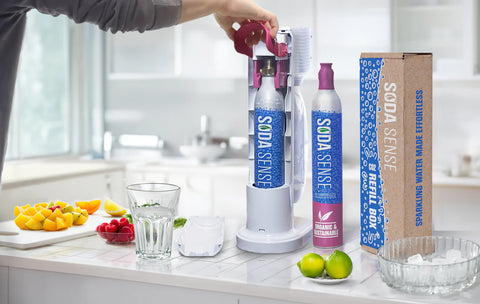
The Truth About 'Forever Chemicals' in Your Water

To answer plainly, yes. Numerous brands contain PFAS, aka forever chemical, concentrations exceeding 1 part per trillion, surpassing the recommendations set by the Environmental Working Group.
But that doesn't end the conversation, let's learn more about the important facts surrounding the ingredients found in commercial sparkling water brands.
At Soda Sense, we believe that informed choices lead to healthier living. As advocates for transparency and control over what we consume, we encourage everyone to become familiar with the ingredients found on commercial labels so they feel empowered to consume with a clear mind.
- What exactly are PFAS?
- Seltzer water brands that contain PFAS
- PFAS in soda
- The lasting health effects of PFAS
- Why make the switch to a home sparkling water maker

What are PFAS?
PFAS, or per- and polyfluoroalkyl substances, are a group of man-made chemicals that have been in use since the 1940s. These chemicals are very persistent in the environment and in the human body, meaning they don’t break down and they can accumulate over time.
PFAS are used in a wide range of consumer products, such as non-stick pans, water-repellent clothing, pizza boxes, and even some canned seltzers due to their resistance to grease, oil, water, and heat.
There is evidence that exposure to PFAS can lead to adverse health outcomes.
Seltzer water brands that contain PFAS
In a report ran in 2020 by Consumer Reports, numerous sparkling water brands were tested for PFAS in their waters. The numbers below alongside each brand represent parts per trillion:
- Perrier Natural Sparkling Mineral Water (1.1)
- La Croix Natural Sparkling Water (1.16)
- Canada Dry Lemon Lime Sparkling Seltzer Water (1.24)
- Poland Spring Zesty Lime Sparkling Water (1.66)
- Bubly Blackberry Sparkling Water (2.24)
- Polar Natural Seltzer Water (6.41)
- Topo Chico Natural Mineral Water (9.76)
Note: it is recommended for products to have less than 1 part per trillion.
PFAS in soda
The presence of PFAS in sodas has become an escalating concern as investigations into these harmful chemicals persist. They are utilized in the lining of soda cans to mitigate corrosion and leaks, but minute amounts of these chemicals can permeate into the beverage itself.
Elevated levels of these compounds can give rise to a range of health issues, including liver damage, elevated cholesterol, and even certain forms of cancer.
The situation becomes even more concerning due to the lack of awareness among consumers. Many soda companies do not provide transparency regarding their use of these chemicals, and the FDA does not enforce mandatory testing or reporting.
Related Read: What Are the Best Alternatives to Soda?

What are the lasting health effects of PFAS?
Some studies have shown that PFAS have the potential to affect the growth, learning, and behavior of infants and older children. It can also lower a woman's chance of getting pregnant, interfere with the body's natural hormones, elevate cholesterol levels, and affect the immune system.
Long-term effects in extreme circumstances include an increase in the risk of cancer, particularly kidney and testicular cancers.
It's important to note that the amount and duration of exposure can significantly influence the severity of these effects.
Let's break some of these effects down further so we can fully understand PFAS impact:
Liver Damage
High PFAS exposure can elevate liver enzymes, indicating potential liver damage. This may result in diminished liver functionality, affecting digestion and detoxification processes.
Harmful to Infants and Children
PFAS pose a significant risk to infants and children, disrupting the body's ability to produce antibodies. This interference compromises the immune system, increasing children's vulnerability to infections.
Furthermore, there is compelling evidence suggesting a correlation between PFAS exposure and the development of attention deficit hyperactivity disorder (ADHD) symptoms in children.
Cardiovascular Diseases
Increasing evidence shows that extended exposure to PFAS may elevate the risk of developing high blood pressure and cardiovascular diseases.
Research suggests a link between elevated PFAS levels and higher cholesterol levels, which is a significant risk factor for heart conditions.
Why make the switch to at-home soda makers?
There are numerous compelling reasons to switch to an at-home soda maker:
1. Soda Makers Allow You to Control the Ingredients
Creating sparkling water at home empowers you to manage the ingredients, sidestep unnecessary additives, and select both your water source and the desired level of carbonation.
This autonomy also opens up the opportunity to explore natural flavors, guaranteeing a refreshing beverage that aligns with your taste and health preferences.
2. Soda Makers Are More Environmentally Friendly
Opting for a home soda maker and Soda Sense's CO2 canister refill service cuts down on waste and carbon emissions through bottle reuse and reduced packaging.
This eco-conscious decision promotes a healthier lifestyle and contributes to global sustainability.
3. Soda Makers Are More Cost-Effective
Investing in a soda maker can seem expensive initially but proves to be more economical in the long run, with homemade sparkling water costing about half as much per liter as store-bought brands.
The additional savings from Soda Sense's CO2 canister refill service further enhance its cost-effectiveness, making it a smart investment for health, wallet, and the environment.
Related Read: Soda Machine vs. Canned Seltzer Water: Which Is More Affordable?
4. Soda Makers Are Convenient and Easy to Use
Soda makers offer a user-friendly way to create freshly carbonated water in seconds, eliminating the need to buy heavy bottles, with the bonus of adding your favorite flavors.
They are easy to maintain with reusable bottles and simple CO2 canister replacement, especially with services like Soda Sense that provide hassle-free CO2 deliveries and exchanges.

Recommended reading

What's the Difference Between Soda Water vs. Club Soda vs. Sparkling Water vs. Tonic Water?
More and more people are looking to improve their health by paying attention to what they consume, down to the drinks they have. Carbonated water has become a go-to alternative to soda because it's...

What Are the Health Benefits of Sparkling Water?
The consumption of sparkling water has been increasing year over year. According to the research, the sparkling water market is expected to expand at a compound annual growth rate (CAGR) of 12.6% f...

Top 13 Most Refreshing Drinks
For a truly refreshing summer, look no further than these 13 delicious and refreshing summer drinks! Crack open some cold sparkling water, pour yourself an icy cocktail, whip up some creamy milksha...